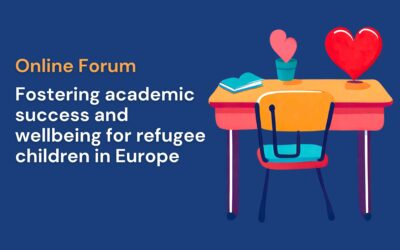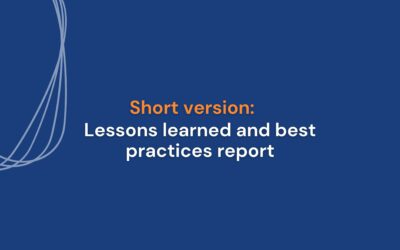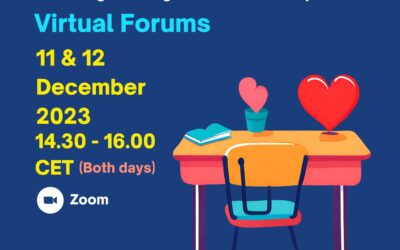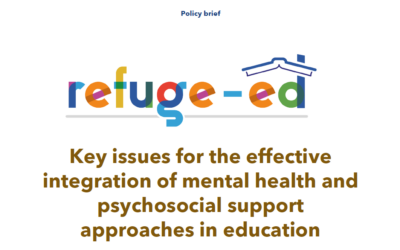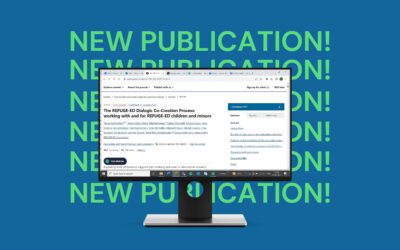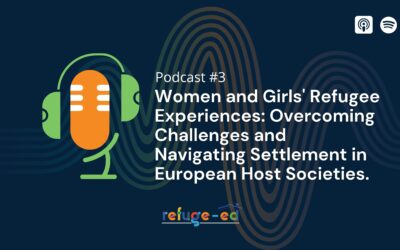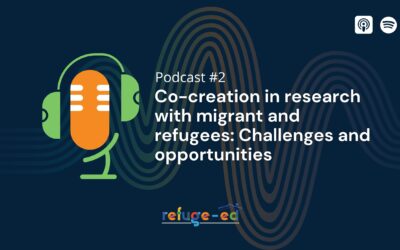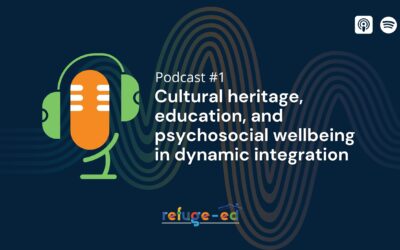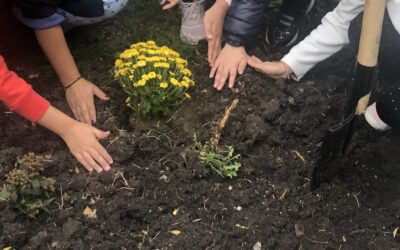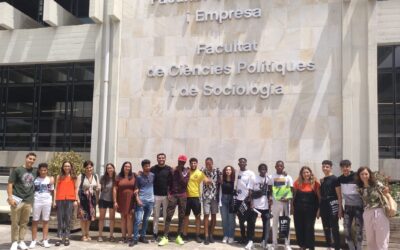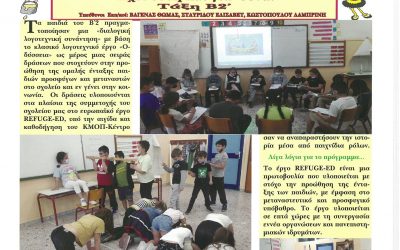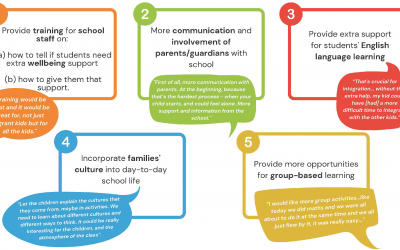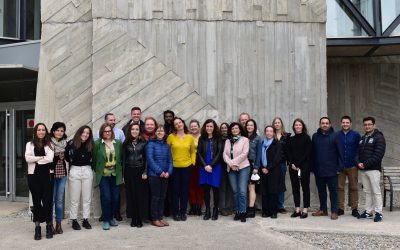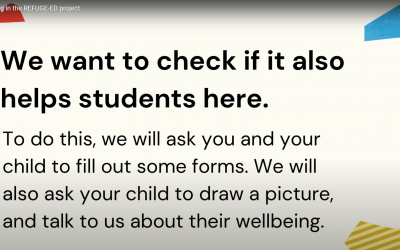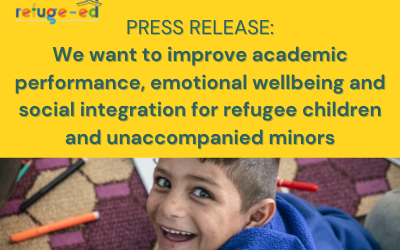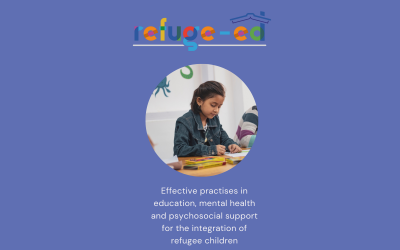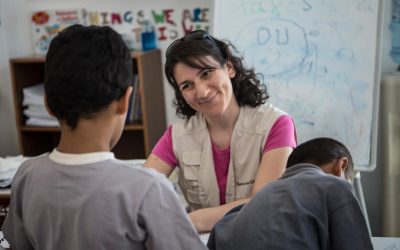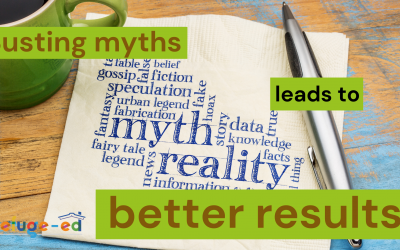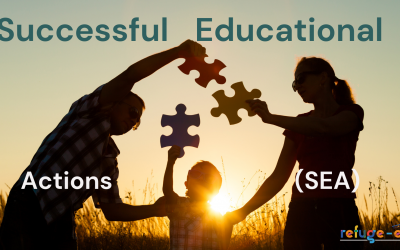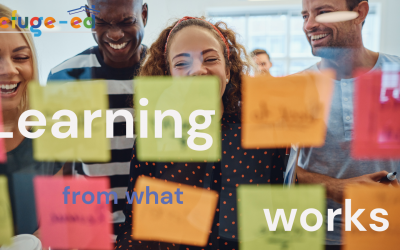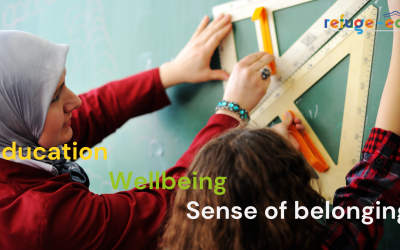Building on the social impact of previous EU research in the field of education and mental health and psychosocial support (MHPSS), REFUGE-ED identified, implemented and evaluated evidence-based practices in education and MHPSS that have been shown to promote...
REFUGE-ED’s website
This document explains in brief the main sections of the project's website: www.refuge-ed.eu
REFUGE-ED dissemination package
The REFUGE-ED Dissemination package is an important tool for effectively fulfilling the objective of "increasing EU citizenship benefits" derived from the project, supporting members of the consortium in communicating with stakeholders, making information about the...
Tools for training, social exchange and co-creation in inclusive and supportive learning environments for dynamic integration: existing resources and pending challenges
The primary objective of this report is the mapping and review of existing tools for training, social exchange and co-creation in Mental Health and Psychosocial Support (MHPSS) and across Successful Educational Actions (SEAs), with emphasis given to tools that address...
The development of the Brokering Knowledge Platform & The Transnational Community of Practice and Learning
The aims and objectives of the Brokering Knowledge Platform (BKP) The BKP (D5.2) is the main output of the REFUGE-ED project. The BKP intended to make scientific knowledge accessible to everyone; this provision of relevant, practical, and accessible information,...
Working group recommendations for the development of the BKP
The REFUGE-ED project identifies, implements and tests effective practices in education and mental health and psychosocial support (MHPSS) that promote the educational success, wellbeing, and sense of belonging of children from recent migration cohorts, refugees and...
Central data repository for outcome and process data collected across the pilot action sites
This document was prepared at the time as a brief guide to collect and store the data collected in the fieldwork. This document was later updated as a result of the implementation of the practices.
Guidelines for carrying out the SPICE research approach
Consistent with the principles of the REFUGE-ED dialogic co-creation process (RDCP), as outlined in D2.2 Guidelines for Pilot Actions’ Implementation, the Supportive Process for the Inclusion of Children’s Experience (SPICE) approach is also based on the premise that...
Compendium of tools to assess MHPSS and education outcomes for children
The goal of this compendium is to present a menu of potential outcomes that the pilot sites may want to measure, and recommendations for assessment tools to measure each of these outcomes.
Final activity report
The present report (subdivided into three ones) is framed under Work Package 3, ‘Implementing pilot actions in three distinctive settings’, and comprehensively presents implementing partners’ trainings, implementation and evaluation results. It follows up on the...
Interim report
During Work Package 3 ‘Implementing pilot actions in three distinctive settings’, partners implemented the trainings and piloting of the co-created practices in schools, Hotspots/Reception and Identification Centres and institution care facilities. The trainings...
Training curriculum for pilots
During the initial phase of the REFUGE-ED project [Effective Practices in Education, Mental Health and Psychosocial Support for the integration of Refugee Children], the project partners identified good practices and approaches in Mental Health and Psychosocial...
Guidelines for pilot actions’ implementation
The REFUGE-ED dialogic co-creation process (hereinafter, RDCP) is the methodological framework that will guide the implementation of the pilot actions during the project. This document introduces the theoretical premises on which the RCDP is based and sketches the...
Selected actions to address the integration challenges of migrant children
This document provides an individualized overview of each of the 46 pilots that are being implemented as part of the REFUGE-ED project in six different countries: Bulgaria, Ireland, Greece, Italy, Spain and Sweden. 3 of the pilots are being implemented in...
Key Issues for the effective integration of the MHPSS approach into education
This report outlines key issues for the effective integration of the MHPSS approach into education. It draws from the results of the WP1 literature and policy review and mapping of different best-practice, tools and solutions in the fields of MHPSS and education (in...
Effective and socially innovative initiatives for the integration of migrant children in Europe
The main objective of this report is to present the effective practices and approaches from the fields of education (including formal, non-formal and informal education), and mental health and psychosocial support (MHPSS) that are efficiently contributing to the...
Refuge-ed Online Forum: Fostering academic success and wellbeing for refugee children in Europe
Through this 2 day forum, we exchanged insights and shared resources, to address the challenges and celebrated the achievements of implementing Successful Educational Actions (SEAs) and Mental Health and Psychosocial Support (MHPSS) for migrant children and their...
Short version: Lessons learned and best practices report
Promoting educational success, promote wellbeing and a sense of belonging for children with a refugee or migrant background has been the ultimate goal of the REFUGE-ED project. To this end, the project has identified, implemented, and evaluated evidence-based...
Lessons learned and best practices report
Building on the social impact of previous EU research in the field of education and mental health and psychosocial support (MHPSS), REFUGE-ED identified, implemented and evaluated evidence-based practices in education and MHPSS that have been shown to promote...
Virtual Forum: “Fostering academic success and wellbeing for refugee children in Europe”
Through this forum, we exchanged insights and shared resources, to address the challenges and celebrate the achievements of implementing Successful Educational Actions (SEAs) and Mental Health and Psychosocial Support (MHPSS) for migrant children and their...
Upcoming event: Promovent l’èxit educatiu i el benestar dels i les joves refugiades d’origen immigrant: Resultats i impacte social del projecte H2020 REFUGE-ED
Comissió Europea, Representació a Barcelona Passeig de Gràcia, 90 4 de Desembre 2023
Policy brief: Key issues for the effective integration of mental health and psychosocial support approaches in education
Children and youth with refugee or asylum seeker background, face many hazards and complex situations. Data from UNHCR indicates that globally 77% of refugee children attend primary school, only 31% of refugee youth access secondary education, and a mere 3% access...
Published Journal: The REFUGE-ED Dialogic Co-Creation Process: working with and for REFUGE-ED children and minors
We are excited to announce that we have a new journal published. The journal discussed and present an innovative co-creation approach to enhances education and mental health support for migrant and refugee communities. Cutting-edge collaboration between researchers...
Episode #3 Women and Girls’ Refugee Experiences: Overcoming Challenges and Navigating Settlement in European Host Societies.
Welcome to this episode of our podcast, where we delve into the compelling topic of "Women and Girls' Refugee Experiences: Overcoming Challenges and Navigating Settlement in European Host Societies." Throughout this engaging discussion, we had the privilege of hearing...
Episode #2: Co-Creation and Research with Migrants and Refugees: Challenges and Opportunities
In this episode we examine co-creative research and implementation which is the common denominator in the three projects in focus during the episode: REFUGE-ED, KIDS4ALL and NEW ABC Project. Participants: Angel Fuentes, Horizon 2020 Project Officer for REFUGE-ED...
Episode #1: REFUGE-ED – Solutions for the dynamic integration of migrants and refugee children
What is the role of cultural heritage, education, and psychosocial well-being in dynamic integration? Dr. Ainhoa Flecha and migration expert Adnan Abdul Ghani discuss different aspects of dynamic integration and how research and science can contribute to better...
How gardens make children feel empowered in togetherness
How gardens make children feel empowered in togetherness Intercultural gardens as green bridges: Transferability of good practices from Horizon 2020’s MATILDE to REFUGE-ED. By Vanina Ninova with contribution of the REFUGE-ED Bulgarian team. The 74th "Gotse Delchev"...
Reversed visit – unaccompanied minors at the UAB
Unaccompanied minors visiting the Autonomous University of BarcelonaNormally, the REFUGE-ED research teams leave their normal place of work to go to the pilot sites. But on the 22nd June, the roles were reversed in Barcelona as a group of ten unaccompanied minors aged...
REFUGE-ED in Greece
Reading ancient Greek myths in GreeceThe children in second grade of the 2nd Elementary School in Renti, Greece are reading about the hero Odysseus from the ancient Greek myth. They are not reading about him in a children’s story book about Greek mythology. They are...
Co-creating academic success, wellbeing and a sense of belonging
Co-creating academic success, wellbeing and a sense of belongingCo-creation is a central concept in the REFUGE-ED project. It is a methodological framework that ensures engagement of all actors in implementation and fosters reflection and learning across interventions...
Consortium meeting
Finally togetherCOVID-19 has done its best to make collaboration in the REFUGE-ED consortium difficult. In late March we finally managed come together physically for the first time since the project began. The Autonomous University of Barcelona hosted the meeting, and...
Informed consent explained in three minutes
Explaining the research process and consent is important. In REFUGE-ED we supplement the official requirements with easily understood methods.
Press release: REFUGE-ED will improve academic performance, emotional wellbeing and social integration for refugee children and unaccompanied minors.
REFUGE-ED will improve academic performance, emotional wellbeing and social integration for refugee children and unaccompanied minors.
REFUGE-ED Flyer
Education, mental wellbeing and belonging are essential for children’s development. Refugees and asylum seekers are no exception. For them, even more is at stake: their chance to become integrated into their new country and community. REFUGE-ED Flyer
Identifying effective mental health and psychosocial support practices
“It’s a jungle out there” is a phrase familiar to many educators – sometimes thinking of the situation in the playground, but often of the massive amount of teaching materials, approaches, systems, and traditions suggesting different ways to increase the academic success, well-being, and social belonging of their students. Identifying the most effective of these practices can be a challenge.
Busting myths in education leads to better results
Busting myths in education leads to better results In education, practice is too often based on myths and assumptions – “edumyths rather than scientific evidence leading to low quality teaching. But when edumyths are replaced by scientific evidence of social impact,...
Successful Educational Actions
The REFUGE-ED project collects knowledge on innovative solutions in education and MHPSS. But what does a successful educational action look like?
Learning from what works
Learning from what works There are already many tools for education and mental health and psychosocial well-being available. In fact, a major challenge in education is choosing the right ones – because how do you know if a tool works for your purpose or not? And how...
Education, well-being and a sense of belonging
Education, well-being and a sense of belonging At the REFUGE-ED project kick off meeting Dr Teresa Sorde Marti of the UAB reminded the consortium of why we are embarking on three years of hard work in the project: “We are brought together by our shared commitment to...

















